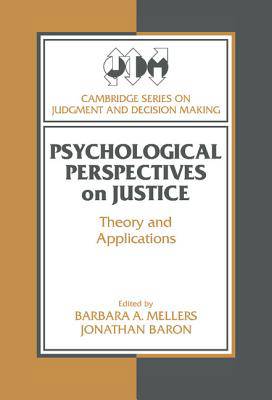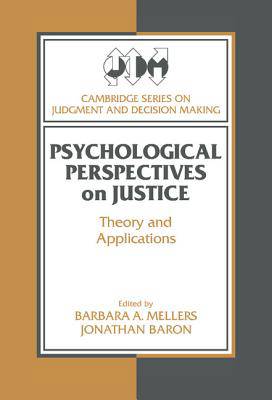
- Afhalen na 1 uur in een winkel met voorraad
- Gratis thuislevering in België vanaf € 30
- Ruim aanbod met 7 miljoen producten
- Afhalen na 1 uur in een winkel met voorraad
- Gratis thuislevering in België vanaf € 30
- Ruim aanbod met 7 miljoen producten
Zoeken
Psychological Perspectives on Justice
Theory and Applications
€ 201,95
+ 403 punten
Omschrijving
Justice, equity, and fairness are central concerns of everyday life. We frequently assess the fairness of individual acts, social programs, and institutional policies. This book explores how distributions of costs and benefits determine our intuitions about fairness. Some chapters examine the extent to which individual behavior deviates from normative theories of justice. This comparison requires an answer to the question of how fair distributions of resources or burdens should be made. Competing theories, such as utilitarianism and economic efficiency, are discussed. Other chapters investigate various rules and heuristics that people use to make fair distributions, the motivation for people to conform to rules of fairness even when they conflict with self-interest, differences between liberals and conservatives in their views about justice, rules that societies actually use to distribute or allocate critical or scarce resources, and implications for public policy. This mixture of theoretical and applied perspectives provides a balanced look at the psychological underpinnings of justice.
Specificaties
Betrokkenen
- Uitgeverij:
Inhoud
- Aantal bladzijden:
- 362
- Taal:
- Engels
- Reeks:
Eigenschappen
- Productcode (EAN):
- 9780521431996
- Verschijningsdatum:
- 24/09/1993
- Uitvoering:
- Hardcover
- Formaat:
- Genaaid
- Afmetingen:
- 157 mm x 231 mm
- Gewicht:
- 612 g

Alleen bij Standaard Boekhandel
+ 403 punten op je klantenkaart van Standaard Boekhandel
Beoordelingen
We publiceren alleen reviews die voldoen aan de voorwaarden voor reviews. Bekijk onze voorwaarden voor reviews.










